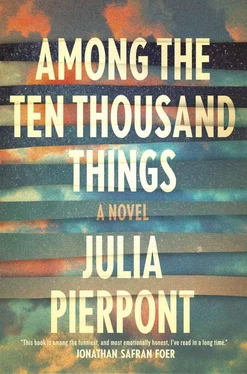What would he and Ruth be to each other now?
Jack came around the side of her chair, cat box aloft like a peace offering. Ruth pushed her headphones off her ears and stopped her Discman. “My tapes,” she said, though she meant CDs. Ruth listened to books. There was one she especially liked about Aristotle on ethics, and another called Don’t Sweat the Small Stuff that she lent once to her daughter and that Deb had returned unplayed.
Jack held the handle high so that Ruth could see in. “Look who’s here,” she cooed. He felt Travolta’s weight recede toward the back of the box and set the whole caboodle down on the glass-topped table.
“Made it in one piece.” He sat beside her, trying to seem easy, though the depth of the chair into which he sank surprised him. He was feeling very low. From his jacket pocket he pulled two golden cans of Ocean Whitefish Feast. “I can go and pick up some more now with the litter—”
“I’ve got litter.” Ruth had had cats once too, though hers were dead some years.
“Don’t you want some new? You’re not going to carry that all from the store—”
“Jack, honey, I’ll tell you a secret. They deliver my groceries. Don’t worry.” She laughed. “I don’t carry a thing. ” The laugh was tired and a little angry, as if it bothered her, this truth about herself. She’d never signed off on getting old.
“Good.” He nodded. “You shouldn’t carry. I mean, you absolutely could, if you wanted, but it’s good you don’t.”
“My friend Lorraine, you know Lorraine? She’s the one that started me on it. She said, ‘Ruthie, why are you killing yourself carrying?’ But Lorraine, she has her own problems. She’s not a well woman. Her feet — nothing serious. Anyway you know me, I’m such a dope, I said what did I need to be paying extra for? So I should hurry home and miss them? So they should forget a bag? Never did it. Never. Always carrying these big bundles home. Years. ”
“That can be difficult.”
“And news flash, Jack, I’m not rich. Lorraine travels, no kids, two husbands divorced — and wealthy men we’re talking, not like my Norman.” It was the kind of conversation Ruth could never have with her daughter, who considered such micromanaging of finances depressing, who would have found her mother’s story tedious and self-exonerating. Fine, do it, Deb would say, but why do we have to talk about it? Jack had never minded Ruth’s soliloquies. He had an idea of what it might mean to be lonely, of how bad it could feel. Ruth, widowed, had not remarried, as his own mother had. He understood that there were people who liked talk, who needed it more than others. And he did think she was funny.
“You’re right, though. It makes more sense that you get them delivered.” He felt relief that she could still be normal with him, and when the ethics of delivered groceries had been exhausted as a topic of conversation, when again they had fallen silent, he wondered if she was surprised at having slipped into their old ways so quickly, if she was even now regretting it.
“Look at him,” Ruth said, turning her attentions on the cat. “Her, I mean. Isn’t that bad? Well, mine were boys.”
“I don’t think she took offense.”
“So,” she said, picking an invisible thread from her blouse. “Deborah knows about your going?”
Jack held hands with himself in his lap.
“Honey, look,” she said, leaning closer. “I don’t get involved. Okay?”
“Thank you.”
“I think you’re an ass, and a moron, ” she said plainly, her voice higher but no louder than before, “but I know my place, and this is not my place.”
“I appreciate it.”
“My girl’s grown up, better or worse.” She laughed that tired-angry laugh. “She has her reasons. What’ll happen, who knows?”
The Shadow knows. Something Jack’s dad used to say. Jack had never heard the radio show firsthand, but his father always made the line sound noirish and pulpy, with a backdrop of heavy rain. Who knows what evil lurks in the hearts of men?
—
Back at the studio, he called Deb.
“Hey,” she said on the fourth ring. She still sounded like herself, and not so far away. Like she could have been just at home, and not in Rhode Island. Not on some other planet he couldn’t reach. “What’s up?”
“How are you? How’s everybody?”
“Good. The kids are good. It’s raining.”
“And our buddy Gar? How’s pretty boy?”
“Don’t, don’t do that.”
“What shouldn’t I do?”
“Gary’s not here until tomorrow.”
“Well, and you? How are you?”
“What do you want, Jack?” There it was. The other planet, orbiting.
When he told her he was flying out to the university that had given him the new commission, to meet the deans and see the space, she didn’t sound all that surprised, even though she knew how seriously he didn’t take them, these commissions.
“My mom can feed Travolta.”
“I took her over there already. So she doesn’t have to go back and forth.”
“Whatever you guys work out.”
“We worked it out, I told you.” He wandered into the little half kitchen. Opened and closed a cabinet for no reason. “It’s good to hear your voice.”
“What do you expect me to say to that?”
Jack said: “You sound really far away.”
Deb said: “I am.”
When they were off the phone he dialed easy, laughing Jolie, to make her guess who was coming to town.
Howard Roark laughed.
His mom, as usual, had been wrong — wrong in this case about the ferry, which did not run every day, not until high season, and so they could not go to Newport, where supposedly there were shops and movie theaters and actual things to do. They couldn’t go to the islands either, not that he wanted to. His mom talked about these stupid islands like the whole world was poetry. Simon thought that if nobody lived on them, it was probably for good reason. What a moron.
Howard Roark laughed.
And she also didn’t think he’d like this book, which was why he was going to.
Deb had taken Kay on one of her walks, which, by now, hour forty-eight in Rhode Island, he’d already learned to decline. Simon wanted to be found reading in full view when they came back, but his mother would never catch him on the bird-shitty porch swing, so he’d gone down by the docks, where the ferry wasn’t, and where there were a few small shops in a row, two of which sold real estate. He sat at the round green table outside the sandwich shop that was closed. The table had a hole in the middle for umbrellas, the size of his fist.
He turned the book over in his hands. “A writer of great power. This is the only novel of ideas written by an American woman that I can recall.” This was what Simon needed, to be dispensed a philosophy, a way of thinking and living and winning. He did not yet know precisely what objectivism was, but he knew it had something to do with ruthlessness as a way of getting what one wanted. Something to do with not being a tool. The cover art, besides, reminded him of Rockefeller Center, a man of gold gripping the sun, or fire. It made him think of ice-skating and of Radio City Music Hall, where he’d gone once to see the Christmas Spectacular.
Okay.
Howard Roark laughed.
Inside the sandwich shop, someone also laughed. He turned but saw only metal shutters.
Back to Howard, naked and on a cliff high up above a lake. So already that was pretty impressive. Definitely a cool opening. Simon looked out over the bay where the water was splashing, not like Howard’s, which was so still as to look stony. Or no — it was that there was stone, around the lake, and that the water was more still than the stone. He was confused by a pause more dynamic than motion, but imagined it was like in The Matrix where the bullets are flying and everything slows.
Читать дальше












